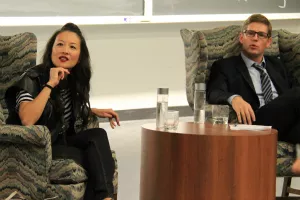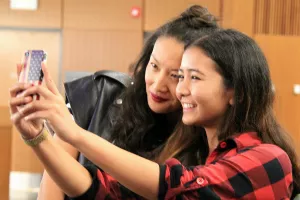
Gossip maven dishes on the surprising benefits of celebrity gossip
Blind item: which Internet gossip columnist-turned entertainment reporter-turned memoirist created a buzz when she was spotted on a certain U of T campus this week?
If you guessed Lainey Lui, you would be correct. Lui visited U of T Mississauga this week to dish on the “Sociology of Celebrity and the Business of Gossip,” a question-and-answer session organized by the UTM sociology department to kick off the academic year.
“Lui has thoughtful, funny and sharp commentary on celebrity culture,” says lecturer Jayne Baker, who has been reading Lui’s blog for years. “When she’s on her show or blogging, her commentary tends to be sociological. She’s someone who is well-known and who can show students what this looks like and the value a sociological perspective can add to the conversation.”
It’s been a decade since Lui got her start in the gossip game with an e-newsletter written for friends who shared her passion for celeb-watching. The newsletter grew into LaineyGossip.com, a site that now draws over a million visitors monthly, and launched Lui’s career as an entertainment reporter, currently as a senior correspondent with eTalk and panelist on CTV’s daytime talk show The Social.
“I’m a crusader for gossip,” Lui told associate professor Erik Schneiderhan, who led the Q&A session. “It’s not weird, or vapid. Some people know sports stats and some people know what Nicole Kidman wore to the Oscars in 1997. That would be me.”
“Gossip is good, if it’s used responsibly,” Lui says. “It has a social value. We may be talking about what a celebrity is doing, but our reactions say a lot about our own communal values, our standards and our expectations. Gossip illuminates what you and I consider to be acceptable behaviour. People can learn what to expect of our own relationships.”
Lui treats her readers as friends, beginning every column with the salutation, “Dear Gossips,” a tactic intended to create a personal connection with her readers. “It’s an exchange, but it has to be fun, and it has to be a conversation,” she says. Those exchanges about a common interest tell us a lot about ourselves and the people we talk to, she adds. “Gossip for men is TSN,” she jokes, when asked if celeb chat is a gendered occupation. “Female gossip about celebrities can be more valuable than talking about sports teams. The ideas that you’re exchanging can be applied to your own life.”
“On my site, I encourage conversations about feminism, class and race—those are topics we can get at by examining celebrity,” she says. “Why is another film about white guys on an adventure getting made, again, when we’re ignoring stories about characters who are Asian, black, Native American or whatever?”

And though Lui’s dedication to gossip has earned her notoriety, she doesn’t see herself in the celebrity category. “A celebrity’s job is to be so interesting that you want to buy their book, download their album, watch their TV show or see their movie,” she says. “Photographers are not waiting for me at the airport. I’m the reporter. I’m never the story.”
After the interview, Lui chatted with students and posed for photographs. Donations were collected on behalf of Covenant House, the organization Lui was working for as a fundraiser when her gossip career began.
